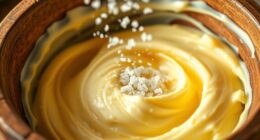Butter can surprisingly aid in weight loss by boosting your metabolism and keeping you full longer. Its high-fat content satisfies cravings and helps enhance calorie burning during exercise. Plus, the butyric acid in butter improves fat utilization, making it easier for your body to burn energy instead of storing it. When included in a balanced diet, butter can enhance satiety, reducing the urge to snack on unhealthy foods. Just remember to consume it in moderation to avoid excess calories. To discover how to incorporate butter effectively into your meals, let's explore its culinary possibilities and benefits further.
Key Takeaways
- Butter can boost metabolism and increase calorie burning, aiding in weight loss efforts.
- The butyric acid in butter improves fat utilization and reduces fat-storing hormones.
- Its high fat content enhances satiety, reducing cravings and unhealthy snacking.
- Butter supports ketogenic diets, maintaining metabolic states conducive to weight loss.
- It improves insulin sensitivity, contributing to better metabolic health and weight management.
Nutritional Profile of Butter

Butter packs a rich nutritional profile that can play a role in your diet. Each tablespoon contains about 102 calories, primarily from its total fat content of 12 grams. Out of that, 7 grams are saturated fat, which often raises eyebrows, but it also includes monounsaturated fat (3 grams) and a small amount of polyunsaturated fat (0.5 grams). Additionally, butter is composed of about 80% milk fat, making it a calorie-dense food. Butter is a dairy product that provides essential nutrients in moderation.
When you look at vitamins, butter shines with 11% of the Daily Value (DV) for vitamin A per tablespoon. It also provides trace amounts of vitamin E, vitamin D, and vitamin K. The presence of beta-carotene is noteworthy, as it's linked to the production of vitamin A in your body. Butter contains vitamins that are essential for various bodily functions, underscoring its nutritional significance. Moreover, butter's composition of approximately 80% fat contributes to its energy-dense nature, supporting its role as a source of calories in the diet.
Butter has minimal minerals, with only 3 milligrams of calcium and similar amounts of phosphorus and potassium. You'll find a bit of cholesterol (around 30 milligrams), but sodium varies significantly depending on whether it's salted or unsalted.
Health Benefits of Butter

Often overlooked in modern diets, butter offers a range of health benefits that can enhance your overall well-being. It's packed with essential vitamins like A, E, K, and D, which support thyroid health, immune function, and bone health. Additionally, global butter consumption trends indicate a resurgence in the popularity of traditional fats among health-conscious consumers. Chia seeds can be a great complement to butter, providing additional health benefits that support weight management, including omega-3 fatty acids that promote heart health.
The vitamin A in butter plays a crucial role in maintaining healthy skin and vision, while vitamin E acts as an antioxidant, protecting your cells from free radical damage. Furthermore, using a butter infuser allows for the creation of flavored butters that can enhance both taste and nutrition.
Butyric acid, found in butter, has anti-inflammatory properties that can improve your digestive health, particularly for those with conditions like Crohn's disease or irritable bowel syndrome (IBS). Additionally, saturated fats in butter exhibit anti-tumor and anti-cancer properties, making it a valuable addition to a health-conscious diet.
Additionally, the conjugated linoleic acid (CLA) present in butter boosts your immune system and may help combat cancer.
Butter also provides essential minerals like selenium, vital for antioxidant functions, and lecithin, which aids in cholesterol metabolism.
The cholesterol in butterfat supports brain and nervous system development in children.
By including butter in your diet, you're not just adding flavor; you're enriching your health with nutrients that support various bodily functions and overall well-being.
Butter's Role in Weight Loss

Incorporating butter into your diet can play a surprising role in weight loss. This creamy fat isn't just a flavorful addition; it can actually boost your metabolism. Studies show that butter increases your basal metabolic rate, helping your body burn calories more efficiently. Additionally, butyric acid, which is found in butter, contributes to improved fat utilization by enhancing your body's resistance to fat-storing hormones. Butter's high fat content is essential for creating a soft, tender crumb in baked goods, which can also help satisfy cravings.
It's particularly effective during moderate exercise, enhancing lipid oxidation, which means your body uses fat as fuel. Butter's medium-chain triglycerides (MCTs) are quickly absorbed and converted into energy, rather than being stored as fat, making it an excellent choice for energy.
If you're following a ketogenic diet, butter's high-fat content supports the metabolic state necessary for weight loss, while butyric acid helps improve your body's fat utilization.
Moreover, adding butter to your meals can reduce hunger and increase satiety. It makes meals more satisfying, helping you avoid unhealthy snacking.
Just remember, moderation is key. While butter offers these benefits, overconsumption can lead to excess calories, countering your weight loss efforts.
Opt for unsalted, grass-fed butter for added nutrients, and pair it with nutrient-dense foods to maintain a balanced diet.
Mechanisms of Weight Loss With Butter

When you think about weight loss, you mightn't immediately consider the role of butter, but its unique mechanisms can support your goals.
Butter contains butyric acid, which your gut microbiota ferments from non-digestible fiber, producing butyrate. This short-chain fatty acid is rapidly absorbed in your gut and serves as a key energy source for colon cells, playing a crucial role in energy metabolism. Studies indicate decreased abundance of butyrate-producing bacteria in individuals with obesity, emphasizing the importance of maintaining a healthy gut microbiome. Additionally, high vibrational energy can enhance your overall well-being, which supports weight loss efforts. Incorporating performance tuning into your diet can also help optimize metabolic processes. Regular consumption of green tea has also been linked to improved metabolic rates and weight management. Furthermore, good oral hygiene practices, like flossing, can contribute to overall health, which may indirectly support weight management.
Butyrate activates lipid oxidation in brown adipose tissue and the liver, helping to reduce body weight and fat mass. It influences important signaling pathways like AMPK and p38, regulating energy homeostasis.
Moreover, butyrate lowers serum triglyceride levels and decreases lipid content in various tissues, which can assist in weight control.
Additionally, butyrate improves insulin sensitivity, vital for metabolic health, and reduces fasting insulin levels. It also affects the gut-brain circuit, which regulates appetite; oral butyrate supplementation can decrease food intake and contribute to weight loss.
Incorporating Butter Into Diet

Butter can be a delicious and nutritious addition to your diet when used thoughtfully. To maximize its benefits, choose organic, grass-fed butter, which offers more omega-3 fatty acids and conjugated linoleic acid (CLA) than butter from grain-fed cows. This choice also avoids the extra salt and additives found in processed and salted varieties. Additionally, European butter is known for its superior quality and flavor, making it a great option for those seeking a richer taste. Incorporating healthy fats into your diet can support overall health and well-being, including the potential to improve respiratory health through better nutrient absorption. Furthermore, antioxidants in healthy fats can help combat oxidative stress in the body.
Use butter as a flavor enhancer instead of relying on it as your main fat source. Melt it in a pan to cook eggs, sauté vegetables, or grill steaks. You can even drizzle melted butter over steamed veggies for an extra flavor boost. Additionally, butter is a rich source of fat-soluble vitamins, which can contribute to overall health.
If you're following a ketogenic diet, consider adding butter to your coffee or incorporating it into low-carb recipes like butter chicken. Cultured butter, with its distinct tangy flavor, can enhance your dishes while still keeping them low in carbs.
Butter works well in a balanced diet, especially for those limiting carbohydrate intake. It complements your macronutrient needs, supporting high-fat, low-carbohydrate plans. You can also explore making ghee for a different texture and flavor. Clarified butter, like ghee, offers a high smoke point for cooking at elevated temperatures while being suitable for those with lactose intolerance.
Drawbacks of Butter Consumption

While butter can enhance your meals and fit into a balanced diet, it's important to recognize its drawbacks.
First, butter is high in saturated fats, which can raise your LDL (bad) cholesterol levels. This increase poses a risk for heart disease and stroke, especially if you consume around 50 grams daily. Additionally, the use of HTTPS for secure login is crucial in maintaining safety while managing dietary information online.
Additionally, butter is calorie-dense, meaning even a small amount packs a lot of calories. If you add just one serving of butter to your daily diet without adjusting elsewhere, you could gain about 10 pounds in a year, which could lead to issues like obesity and type 2 diabetes.
You should also consider potential allergies or sensitivities. Butter contains lactose and casein, which can cause digestive discomfort for those who are lactose intolerant or allergic.
Lastly, the environmental impact of butter production is concerning, as it contributes to greenhouse gas emissions and habitat destruction.
Plus, some studies indicate that the saturated fats in butter may trigger inflammation, which is linked to various health problems. Being aware of these drawbacks can help you make informed dietary choices.
Frequently Asked Questions
Can Butter Replace Other Fats in Cooking?
Yes, butter can replace other fats in cooking, but it's important to choose the right substitute based on your recipe.
For sautéing and frying, oils like olive or avocado work well due to their high smoke points.
If you're baking, consider using coconut oil or ghee instead.
Keep in mind that certain dishes, like frostings, need solid fats, so butter's unique properties may be essential for those recipes.
Is Butter Suitable for Vegan Diets?
Butter isn't suitable for vegan diets since it's made from cow's milk, which directly contradicts vegan principles.
When you choose a vegan lifestyle, you aim to avoid animal products. Luckily, there are plenty of delicious plant-based alternatives, like vegan butter made from oils, or even avocado, that can easily replace butter in your cooking and baking.
These options not only align with your dietary choices but also support ethical eating practices.
How Does Butter's Taste Affect Food Choices?
Butter's taste significantly influences your food choices. Its rich, creamy flavor activates your brain's reward system, making meals more satisfying and enjoyable.
You're likely to gravitate towards dishes that include butter, as it enhances the overall taste of various foods. This appeal can lead you to prefer high-energy options, potentially increasing your calorie intake.
Ultimately, the delicious taste of butter can make it hard to resist, shaping your eating habits in the process.
What Are the Best Alternatives to Butter?
If you're looking for the best alternatives to butter, consider options like olive oil spread, avocado oil, or ghee.
Nut butters such as almond or peanut butter can also add flavor and healthy fats.
For a lighter choice, whipped or light butter works well.
You might also try hummus or mashed avocado for a creamy texture without the calories.
Experimenting with these alternatives can enhance your meals while keeping them nutritious!
Can Butter Contribute to Heart Disease Risk?
Yes, butter can contribute to heart disease risk. When you consume butter, its high saturated fat content can raise your LDL cholesterol levels, which is linked to an increased risk of coronary artery disease.
If your overall diet is also high in saturated fats, the risk becomes even greater. To improve heart health, it's wise to limit butter intake and consider replacing it with healthier fats, like those found in nuts and vegetable oils.
Conclusion
Incorporating butter into your diet can be beneficial when done mindfully. Its rich nutritional profile and potential health benefits might surprise you, especially when it comes to weight loss. By understanding how butter can fit into your meals, you can enjoy its flavor while supporting your goals. Just remember to balance your intake and be aware of the drawbacks. With the right approach, butter can be a delicious part of your journey to a healthier you!









